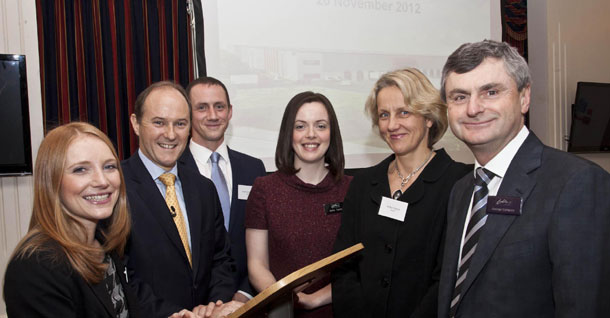 SEGRO chief executive David Sleath outlined the group’s history and its recent successes as well as the challenges facing the property industry in these difficult economic times at the annual Lodders Solicitors Real Estate Conference.
SEGRO chief executive David Sleath outlined the group’s history and its recent successes as well as the challenges facing the property industry in these difficult economic times at the annual Lodders Solicitors Real Estate Conference.
Hosted by the Stratford-upon-Avon law firm at Henley Golf & Country Club, delegates heard Mr Sleath, chief executive of quoted real estate investment trust SEGRO, expand on the company’s successes.
He said that as an asset class, industrial property had consistently outperformed the broader property market and it was therefore seen as a very attractive long term investment for Real Estate Investment Trusts.
However he cautioned that SEGRO and other property companies were being held back with their growth plans due to the cautious approach being taken by many companies to their long terms plans and the continuing uncertainty surrounding economic growth.
“Budget reductions have yet to bite, and the lack of economic growth is a concern to many businesses.” he said.
He also called on the Government to make a decision on whether to opt for expansion at Heathrow or to propose alternative plans.
“With many assets at Heathrow, we clearly have a vested interest but what business desperately needs is an early decision. It’s unhelpful for the UK economy for the Government to kick this issue into the long grass until after the next Election.
“They are hesitating while the likes of Schiphol, Frankfurt and Charles de Gaulle airports will continue to grow and attract new trade.” he said.
With its origins based around the former Slough Estates plc, SEGRO now has a portfolio of around £5 billion worth of property, mostly industrial and warehousing space, based in London and the south east, and increasingly in France, Germany, Poland and the Czech Republic.
He also discussed the reasons why Real Estate Investment Trusts (REITs) have not taken off in the UK since their introduction in 2007.
“The UK model has not yet reached its full potential because there was an immediate downturn after REITs started in 2007, but also very few of the UK property companies that converted to REIT status look or act like REITs in other countries.
Mr Sleath said that successful REITs in other countries were all about creating a low risk but growing dividend stream to investors with the opportunity for capital value growth. SEGRO, he said, was well placed to provide this, with very attractive growth drivers.
He cited the trends towards outsourcing local distribution and the growth in support services, the expansion of online and convenience shopping and the recovery in hi-tech manufacturing and engineering and allied service sectors, as factors that had contributed to SEGRO’s growth.
“Increasingly global trade and supply chain improvements are driving demand for new warehouses, hence our focus on quality, modern industrial assets.”
He said that SEGRO was in the process of selling £1.4 billion of non-core assets with some £500 million sold so far. The business had also paid £300 million for UK Logistics Fund and some £130 million for French assets.
But he said the market challenges faced by everyone in the property market included macro economic uncertainty, low or no growth, banks deleveraging, Government austerity measures and slow occupier demand.
“People are risk averse and there is no appetite for lending to the smaller property companies. These are the challenges many in the industry face,” he said.
His address was welcomed by Lodders chairman George Campion who also welcomed speakers from insurance giant AON including Anka Taylor of the transaction liability unit and Mark Swallow who discussed legal indemnities.
The seminar was concluded with presentations from Lodders partner Louise Igoe who outlined Inheritance Tax and Business Property Relief (BPR) issues, highlighting the importance of demonstrating that a property enterprise is a “wholly or mainly trading business” rather than simply an investment vehicle in order for the company to claim BPR.
“Even when you have taken care in setting up the company, do not let the investment activities overtake the trading activities,” she said.
And she stressed the importance of planning for the future. “It is important to think about succession at an early stage, particularly in a family business, and you should regularly review your personal and business affairs,” she said.
Associate Sofia Tayton examined the role of powers of attorney in commercial matters.
She examined two case studies to demonstrate the effect of a debilitating illness or unforeseen event such as a serious car accident and how it would impact not only on personal assets but also the running of business assets.
She said it was important to protect all personal and business interests and powers of attorney should be considered to ensure continuity and that the individual’s wishes were carried out.
Lodders Solicitors, which has offices in Stratford-upon-Avon, Henley-in-Arden and Cirencester, has one of the region’s busiest real estate teams, acting for many of the Midlands and Cotswolds most active investors and developers as well as advising owner-occupiers and landlords.



















